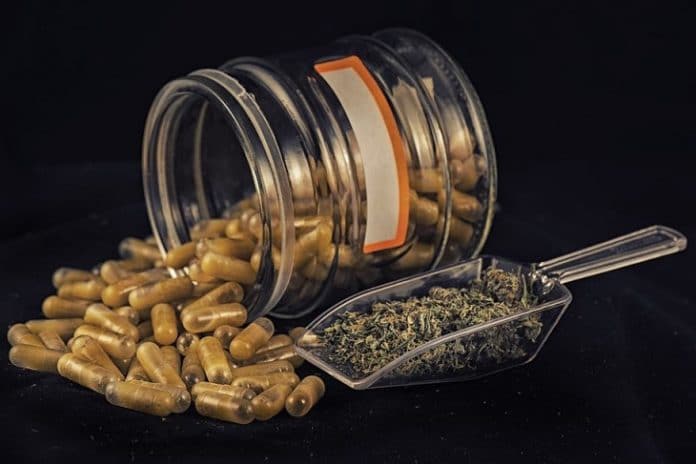A new drug derived from marijuana has led to a landmark change in the US government’s stance on cannabis.
After being greenlit as the first federally approved cannabis-based medication at the end of June, the drug has triggered the nation’s top drug enforcer to change how it regulates marijuana. It’s the first time in 46 years that the agency has shifted its stance on a marijuana compound.
The drug, Epidiolex, is designed to treat two rare forms of childhood epilepsy using cannabidiol, or CBD, the compound in marijuana not responsible for a high. The latest move means people can now access the drug with a doctor’s prescription – though it won’t be cheap.
The Drug Enforcement Administration announced the change to its classification of Food and Drug Administration-approved drugs containing CBD on Thursday, roughly three months after the FDA approved Epidiolex as a medication.
Some researchers expected the agency to reschedule CBD entirely. Instead, the DEA rescheduled FDA-approved medications containing the compound.
Still, experts say the approval could unleash a wave of new interest in the potential medical applications of CBD and other marijuana compounds.
When the FDA approved Epidiolex in June, it triggered a 90-day countdown clock for the DEA to change its stance on marijuana.
“We don’t have a choice on that,” the DEA’s public-affairs officer, Barbara Carreno, told Business Insider just after Epidiolex’s approval. CBD, she said, “absolutely has to become Schedule 2, 3, 4, or 5.”
That’s not exactly what happened. Instead of rescheduling CBD, the agency chose to reschedule drugs containing CBD that the FDA has already approved; those drugs will now be classified as Schedule 5. But at the moment, the only drug that fits the description is Epidiolex.
For comparison, the popular ADHD medication Adderall is in Schedule 2, one step down from marijuana. That means that while it can legally be prescribed by a doctor, it still is considered to have “a high potential for abuse” or harm. Schedule 5 drugs are those considered to have the lowest abuse potential and include drugs like cough syrups made with codeine.
Since 1972, the DEA has kept a tight lid on cannabis. That year, Attorney General John Mitchell named it a Schedule 1 drug “with no currently accepted medical use,” making illegal all its components, from psychoactive THC to non-psychoactive CBD.
Carreno previously told Business Insider that the shift would trigger what she called a “sea change” for CBD manufacturers and the industry as a whole, which has existed in a kind of legal gray area, with some manufacturers selling marijuana-derived CBD products only in states where marijuana had been legalized. It’s unclear whether that will continue with the agency’s move.
Scientists and advocates representing families of people with epilepsy have hailed Epidiolex as a long-awaited treatment.
But they are also aware that desperate people – especially parents of young children – may seek alternate sources of CBD that might be cheaper and don’t require a prescription. In August, GW Pharmaceuticals, the company that makes Epidiolex, announced on a call with investors that the treatment would cost roughly $32,500 a year.
In states where marijuana is legal – or in states with laws that had made CBD legal before the DEA rescheduled it – less expensive CBD-based oils and salves are widely available. But experts caution that these products may not be what they seem.
“What’s different with this drug is that this is a well-studied and well-controlled product,” Laura Lubbers, the chief scientific officer of a nonprofit called Cure that funds epilepsy research, previously told Business Insider of Epidiolex. By contrast, most dispensary-grade CBD products are neither.
For a study published last year in the Journal of the American Medical Association, researchers tested 84 products purchased from 31 online CBD sellers. They found that roughly seven out of 10 items had levels of CBD different from what was written on the label. Of all the items they tested, roughly half had more CBD than was indicated, while a quarter had less. And 18 of the samples tested positive for THC, despite it not being listed on the label.
“The main thing is that CBD as approved by the FDA is pharmaceutical-grade CBD. It’s manufactured under stringent standards, the same as other FDA-approved drugs,” Shlomo Shinnar, the president of the American Epilepsy Society who teaches neurology and epidemiology at the Albert Einstein College of Medicine, told Business Insider in June.
A catalyst for more research into marijuana-derived drugs
Epidiolex’s approval could also be a powerful catalyst for deeper research into other marijuana-derived medicines. CBD and THC are two of the more than 400 compounds in cannabis, and researchers think the others could hold promise as well.
Apart from CBD, researchers are also studying whether THC and other marijuana compounds could have a range of medical uses, from relieving pain to soothing severe nausea.
Although Epidiolex is the first marijuana-plant-based drug to land FDA approval, the agency has already given the green light to drugs whose active ingredient is a lab-made version of THC.
In the meantime, experts look forward to seeing Epidiolex made available to people who need it.
“I’m not currently aware of any other major new drugs that are close to being where this drug is,” Shinnar said.














